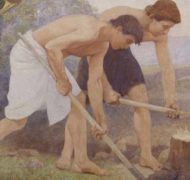My Yoke Is Easy (Matthew 11:28-30)
Bible Commentary / Produced by TOW Project
As we walk through Matthew’s Gospel, we see that opposition to Jesus—his message and his actions—is increasing. It culminates in Matthew 12:14 with the religious leaders’ decision to stop him, even if it means killing him. This foreshadows and sets in motion the end to which the whole narrative is pointing: Jesus’ crucifixion in Jerusalem. Knowing what lies ahead of him, Jesus nevertheless tells his followers,
Come to me, all you that are weary and are carrying heavy burdens, and I will give you rest. Take my yoke upon you, and learn from me; for I am gentle and humble in heart, and you will find rest for your souls. For my yoke is easy, and my burden is light. (Matt. 11:28-30)
If we do our work in yoke with him, we will find fulfillment and experience good relationships with God and people.[1] When God gave work to Adam in the Garden of Eden, the work was easy and the burden light under God's authority. When the human pair rebelled against their Maker, the character of work changed to hard labor against thorns and thistles (Genesis 3). Jesus invites us to work in yoke with him with the promise of rest for our souls. (For more on working in yoke with Christ, see "2 Corinthians 6:14-18" in 2 Corinthians and Work at www.theologyofwork.org.)
For an application of this passage, see "Change Tactics as You Grow" at Country Supply Study Guide by clicking here.
Frederick Dale Bruner, Matthew: A Commentary. Volume 1: The Christbook, Matthew 1-12, Revised & enlarged (Grand Rapids: Wm. B. Eerdmans Publishing Co., 2007), 537-540.
Popular Content
Popular Content
Table of Contents
- Matthew and Work
- Introduction to the Book of Matthew
- Working as Citizens of God’s Kingdom (Matthew 1-4)
-
The Kingdom of Heaven at Work in Us (Matthew 5-7)
-
The Beatitudes (Matthew 5:1-12)
- "Blessed Are the Poor in Spirit, for Theirs is the Kingdom of Heaven" (Matthew 5:3)
- "Blessed Are Those Who Mourn, for They Will be Comforted" (Matthew 5:4)
- “Blessed Are the Meek, for They Will Inherit the Earth“ (Matthew 5:5)
- "Blessed Are Those Who Hunger and Thirst for Righteousness" (Matthew 5:6)
- “Blessed Are the Merciful, for They Will Receive Mercy” (Matthew 5:7)
- "Blessed Are the Pure in Heart, for They Will See God" (Matthew 5:8)
- "Blessed Are the Peacemakers, for They Will Be Called Children of God" (Matt 5:9)
- "Blessed Are Those Who Are Persecuted for Righteousness' Sake" (Matt 5:10)
- Salt and Light in the World of Work (Matthew 5:13-16)
- What Is Righteousness? (Matthew 5:17-48)
- Wealth and Provision (Matthew 6)
- Moral Guidance (Matthew 7)
-
The Beatitudes (Matthew 5:1-12)
- Jesus Heals Many (Matthew 8-9)
- Laborers Deserve Their Food (Matthew 10)
- Tales of Two Kingdoms (Matthew 11-17)
-
Living in the New Kingdom (Matthew 18-25)
- Conflict Resolution (Matthew 18:15-35)
- The Rich Young Man (Matthew 19:16-30)
- The Laborers in the Vineyard (Matthew 20:1-16)
- Servant Leadership (Matthew 20:20-28)
- Parable of the Two Sons (Matthew 21:28-32)
- Parable of the Tenants (Matthew 21:33-41)
- The Great Commandment is a Great Framework (Matthew 22:34-40)
- Parable of the Faithful Servant (Matthew 24:45-51)
- The Parable of the Talents (Matthew 25:14-30)
- Sheep and Goats (Matthew 25:31-46)
- The Last Supper (Matthew 26:17-30)
- Jesus’ Death and Resurrection (Matthew 27-28)
- Conclusion to Matthew
- Key Verses and Themes in Matthew
Donate
Topics
Copyright
Image by Charles Sprague Pearce . Used with Permission.
Contributors: Jonathan Pennington and Alice Mathews, July 6, 2011. Revised Nov. 4, 2011.
Theology of Work Project Online Materials by Theology of Work Project, Inc. is licensed under a Creative Commons Attribution-NonCommercial 4.0 International License. Based on a work at www.theologyofwork.org
You are free to share (to copy, distribute and transmit the work), and remix (to adapt the work) for non-commercial use only, under the condition that you must attribute the work to the Theology of Work Project, Inc., but not in any way that suggests that it endorses you or your use of the work.
© 2011 by the Theology of Work Project, Inc.
Unless otherwise noted, the Scripture quotations contained herein are from the New Revised Standard Version Bible, Copyright © 1989, Division of Christian Education of the National Council of the Churches of Christ in the U.S.A., and are used by permission. All rights reserved.






